华工正源中文站华工正源
- +86-27-87180102
-
社交媒体
 微信公众账号
微信公众账号 手机站
手机站
 微信公众账号
微信公众账号
 手机站
手机站

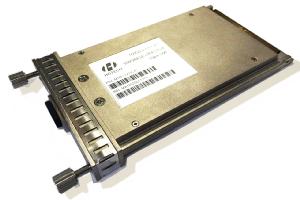
| 产品模块: | 100G BASE-LR4/OTU4 CFP Transceiver |
| 订购信息: | |
| 验证码: |
|
| 类 别: | 电子邮箱: | ||
| 电 话: | QQ: | ||
| *标题: | |||
| *留言内容: | |||
| *验证码: |
|
||
Description
MTRC-DG3CA CFP transceivers are designed for use in 100Gigabit Ethernet links and OTU4 over 10km single module fiber, and it compliant to the CFP MSA and IEEE 802.3ba 100GBASE-LR4. Digital diagnostics are available via MDIO as specified in the CFP MSA Management Interface Specification.
The transceiver's designs are optimized for high performance and cost efficiency to provide customers the best solutions for Datacom and Telecom applications.
Features
l Up to10km transmission on SMF
l Support Dual Rate 103.1G and 111.8Gbps
l Transmitter:4-lane*28Gb/s LAN-WDM EML TOSA (1295.56nm,1300.05nm,1304.58nm,1309.14nm)
l Receiver:4-lane*28Gb/s PIN ROSA
l 10*10G Electrical Serial Interface (CAUI/OTL4.10)
l MDIO management interface with Digital Diagnostic
l CFP MSA package with duplex LC connector
+3.3V power supply
l Power consumption less than 12W l Operating case temperature: 0~+70°C
Applications
l 100GE Routers and Switches
l 100G DWDM/OTN
l 100G Network Security
Compliance
l Compliant with IEEE 802.3ba 100GBASER-LR4 l
l Compliant with ITU-T 411-9D1F
l Compliant with CFP MSA Hardware Specification Rev1.4
l Compliant with CFP MSA MDIO Specification Rev1.4
|
Absolute Maximum Ratings |
|
|
|
|
|
|
Parameter |
Symbol |
Conditions |
Min. |
Max. |
Unit |
|
Storage Temperature(Case) |
TS |
|
-40 |
+85 |
℃ |
|
Relative Humidity |
RH |
|
5 |
+85 |
% |
|
Damage Threshold for Receiver |
Pmax |
|
- |
+10.0 |
dBm |
|
Power Supply |
Vcc |
|
-0.3 |
+3.6 |
V |
|
ESD Sensitivity on module and all host pins |
HBM |
Human Body model R=1.5K, C=100pF |
- |
2000 |
V |
|
|
|
|
|
||
|
Parameter |
Symbol |
Min. |
Typical |
Max. |
Unit |
|
Operating Case Temperature |
Tc |
0 |
- |
+70 |
℃ |
|
Supply voltage |
Vcc 3.3V |
+3.14 |
+3.3 |
+3.47 |
V |
|
Supply Current |
Icc 3.3V |
- |
- |
3.3 |
A |
|
Power dissipation |
P |
- |
- |
12 |
W |
|
Low Power dissipation |
PLow |
|
|
2 |
W |
|
In-rush Curent |
I-inrush |
|
|
50 |
mA/us |
|
Turn-off rush Curent |
I-turnoff |
-50 |
|
|
mA/us |
|
Link Distance |
L |
2M |
- |
10km |
|
|
Transmitter Operating Characteristic-Optical (100GBASE-LR4) |
|
|||||
|
Parameter |
Symbol |
Condition |
Min. |
Typical |
Max. |
Unit |
|
Channel data rate |
|
|
|
25.7812 |
|
Gbps |
|
Aggregate data rate |
|
|
|
103.125 |
|
Gbps |
|
Data rate variation |
|
|
-100 |
|
+100 |
ppm |
|
Lane Center Wavelength |
λcT0 |
|
1294.53 |
1295.56 |
1296.59 |
nm |
|
λcT1 |
|
1299.02 |
1300.05 |
1301.09 |
nm |
|
|
λcT2 |
|
1303.54 |
1304.58 |
1305.63 |
nm |
|
|
λcT3 |
|
1308.09 |
1309.14 |
1310.19 |
nm |
|
|
Total Average Launch Power |
Pout |
|
- |
- |
10.5 |
dBm |
|
Average Launch Power per Lane |
Peach |
|
-4.3 |
- |
4.5 |
dBm |
|
Optical Modulation Amplitude per Lane |
OMA |
|
-1.3 |
- |
4.5 |
dBm |
|
Difference in Launch power |
|
|
- |
- |
5.0 |
dB |
|
between any two lances(OMA) |
|
|
|
|
|
|
|
Launch power in OMA minus TDP, per lane |
Pomatdp |
|
-2.3 |
- |
- |
dBm |
|
Average Launch Power of TX_DIS Transmitter per lane |
Poff |
TX_DIS=H |
- |
- |
-30 |
dBm |
|
Extinction Ratio |
ER |
|
4 |
5.5 |
- |
dB |
|
SMSR |
SMSR |
|
30 |
- |
- |
dB |
|
Dispersion Penalty |
DP |
10km SMF |
- |
- |
2.2 |
dB |
|
Relative Intensity Noise |
RIN |
Mod off |
- |
- |
-130 |
dB/Hz |
|
Opitcal Return Loss Tolerance |
TRL |
|
- |
- |
20 |
dB |
|
Transmitter reflectance |
Tef |
|
- |
- |
-12 |
dB |
|
Optical Eye Mask {X1, X2, X3, Y1, Y2, Y3}1 |
EMM |
|
{0.25, 0.4, 0.45, 0.25, 0.28, 0.4} |
|
||
Notes:
[1] Please refer to Figure 1
|
Receiver Operating Characteristic-Optical (100GBASE-LR4) |
|
|||||
|
Parameter |
Symbol |
Condition |
Min. |
Typical |
Max. |
Unit |
|
Channel data rate |
|
|
|
25.7812 |
|
Gbps |
|
Data rate variation |
|
|
-100 |
|
+100 |
ppm |
|
Lane Center Wavelength |
λcT0 |
|
1294.53 |
1295.56 |
1296.59 |
nm |
|
λcT1 |
|
1299.02 |
1300.05 |
1301.09 |
nm |
|
|
λcT2 |
|
1303.54 |
1304.58 |
1305.63 |
nm |
|
|
λcT3 |
|
1308.09 |
1309.14 |
1310.19 |
nm |
|
|
Damage threshold |
PDT |
|
- |
5.5 |
- |
dBm |
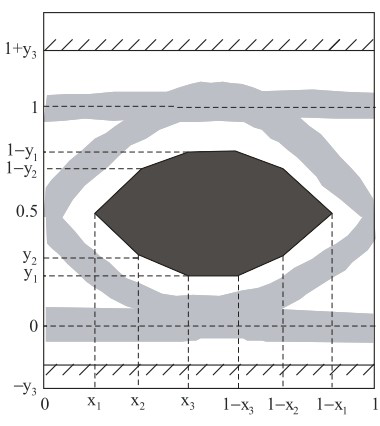
Figure 1. Transmission eye mask definition
|
Average receiver power per lane |
Rpow |
|
-10.6 |
- |
4.5 |
dBm |
|
Receive power OMA per Lane |
Rovl |
|
- |
- |
4.5 |
dBm |
|
Difference in receive power between any two lanes(OMA) |
|
|
- |
- |
5.5 |
dB |
|
Receiver Sensitivity(OMA) per lane |
Psen |
|
- |
- |
-8.6 |
dBm |
|
Stressed Receiver Sensitivity per Lane |
Psen_str |
|
- |
- |
-6.8 |
dBm |
|
Receiver Reflectance |
Ref |
|
- |
- |
-26 |
dB |
|
Conditions of stressed receiver sensitivity test |
|
|
|
|
||
|
Vertical eye closure penalty per Lane |
|
|
- |
- |
1.8 |
dB |
|
Stressed eye jitter per Lane |
|
|
- |
- |
0.3 |
UI |
|
Rx-Lane LOS Assert |
|
|
- |
- |
-12 |
dBm |
|
Rx-Lane LOS Deassert |
|
|
-13.6 |
- |
- |
dBm |
|
Rx-Lane LOS Hysteresis |
|
|
0.5 |
- |
- |
dB |
|
Transmitter Operating Characteristic-Optical (OTU4) |
|
|
||||
|
Parameter |
Symbol |
Condition |
Min. |
Typical |
Max. |
Unit |
|
Channel data rate |
|
|
|
27.9525 |
|
Gbps |
|
Aggregate data rate |
|
|
|
111.809 |
|
Gbps |
|
Data rate variation |
|
|
-20 |
|
+20 |
ppm |
|
Lane Center Wavelength |
λcT0 |
|
1294.53 |
1295.56 |
1296.59 |
nm |
|
λcT1 |
|
1299.02 |
1300.05 |
1301.09 |
nm |
|
|
λcT2 |
|
1303.54 |
1304.58 |
1305.63 |
nm |
|
|
λcT3 |
|
1308.09 |
1309.14 |
1310.19 |
nm |
|
|
Total Average Launch Power |
Pout |
|
- |
- |
8.9 |
dBm |
|
Average Launch Power per Lane |
Peach |
|
-2.5 |
- |
2.9 |
dBm |
|
Optical Modulation Amplitude per Lane |
OMA |
|
-1.2 |
- |
4.5 |
dBm |
|
Difference in Launch power between any two lances(OMA) |
|
|
- |
- |
5.0 |
dB |
|
Average Launch Power of TX_DIS Transmitter per lane |
Poff |
TX_DIS=H |
- |
- |
-30 |
dBm |
|
Extinction Ratio |
ER |
|
7 |
- |
- |
dB |
|
SMSR |
SMSR |
|
30 |
- |
- |
dB |
|
Relative Intensity Noise |
RIN |
Mod off |
- |
- |
-130 |
dB/Hz |
|
Opitcal Return Loss Tolerance |
TRL |
|
- |
- |
20 |
dB |
|
Transmitter reflectance |
Tef |
|
- |
- |
-26 |
dB |
|
Optical Eye Mask {X1, X2, X3, Y1, Y2, Y3}1 |
EMM |
|
|
NRZ 25G RATIO {x1:0.25,x2:0.4,x3:0.45, y1:0.25,y2:0.28,y3:0.4 |
|
|
|
Receiver Operating Characteristic-Optical (OTU4) |
|
|
||||
|
Parameter |
Symbol |
Condition |
Min. |
Typical |
Max. |
Unit |
|
Channel data rate |
|
|
|
27.9525 |
|
Gbps |
|
Data rate variation |
|
|
-20 |
|
+20 |
ppm |
|
Lane Center Wavelength |
λcT0 |
|
1294.53 |
1295.56 |
1296.59 |
nm |
|
λcT1 |
|
1299.02 |
1300.05 |
1301.09 |
nm |
|
|
λcT2 |
|
1303.54 |
1304.58 |
1305.63 |
nm |
|
|
λcT3 |
|
1308.09 |
1309.14 |
1310.19 |
nm |
|
|
Damage threshold |
PDT |
|
- |
5.5 |
- |
dBm |
|
Average receiver power per lane |
Rpow |
|
-8.8 |
- |
2.9 |
dBm |
|
Average total input power |
|
|
|
|
8.9 |
dBm |
|
Channel power difference |
|
|
|
|
5.5 |
dB |
|
Optical path penalty |
|
|
|
|
1.5 |
dB |
|
Receiver Sensitivity per lane2 |
Psen |
|
- |
- |
-10.3 |
dBm |
|
Receiver Reflectance |
Ref |
|
- |
- |
-26 |
dB |
|
Rx-Lane LOS Assert |
|
|
-13.6 |
- |
- |
dBm |
|
Rx-Lane LOS Deassert |
|
|
- |
- |
-12 |
dBm |
|
Rx-Lane LOS Hysteresis |
|
|
0.5 |
- |
- |
dB |
[1] Please refer to Figure 1
[2] OTU-4 Rate without FEC, BER < 10-12, ER > 7dB
|
Electrical High Speed I/O Interface Characteristic-Transmitter(CAUI input interface) |
|||||||||||||
|
Parameter |
Symbol |
Condition |
Min. |
Typical |
Max. |
Unit |
|||||||
|
Signal Rate Per Lane |
|
|
|
10.3125 |
|
Gb/s |
|||||||
|
Signal Rate Tolerance |
|
|
-100 |
|
100 |
ppm |
|||||||
|
AC Common Mode input Voltage Tolerance(RMS) |
|
|
|
|
20 |
mV |
|||||||
|
Differential input return loss |
Rldiff |
IEEE 802.3ba-2010 |
See Equation (83B–7) |
dB |
|||||||||
|
Total Input Jitter Tolerance |
Tjin |
|
|
|
0.62 |
UI |
|||||||
|
Deterministic Input Jitter |
Tdin |
|
|
|
0.42 |
UI |
|||||||
|
Tolerance |
|
|
|
|
|
|
|||||||
|
Transmitter Input Eye Mask (X1, X2) |
|
|
(0.31, 0.5) |
|
UI1 |
||||||||
|
Transmitter Input Eye Mask (Y1, Y2) |
|
|
(42.5, 425) |
|
mV1 |
||||||||
Notes:
[1] Please refer to Figure 2
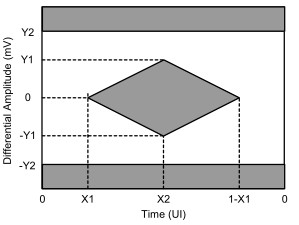
Figure 2.CAUI receiver eye mask
|
Electrical High Speed I/O Interface Characteristic-Receiver(CAUI output interface) |
||||||
|
Parameter |
Symbol |
Condition |
Min. |
Typical |
Max. |
Unit |
|
Signal Rate Per Lane |
|
|
|
10.3125 |
|
Gb/s |
|
Signal Rate Tolerance |
|
|
-100 |
|
100 |
ppm |
|
Single-ended output voltage |
Vosig |
|
-0.4 |
|
4 |
V |
|
Output AC common-mode voltage(RMS) |
VocomA C |
|
|
|
15 |
mV |
|
Output transition time |
Tr |
20%~80% |
24 |
- |
- |
ps |
|
Differential output return loss |
|
IEEE 802.3ba-2010 |
See Equation (83B–5) |
dB |
||
|
Total Jitter |
Tj |
|
|
|
0.4 |
UI |
|
Deterministic Jitter |
Tdj |
|
|
|
0.25 |
UI |
|
Receiver Output Eye Mask (X1, X2) |
|
|
(0.2, 0.5) |
UI2 |
||
|
Receiver Output Eye Mask (Y1, Y2) |
|
|
(136, 380) |
mV2 |
||
Notes:
[1] Please refer to Figure 3
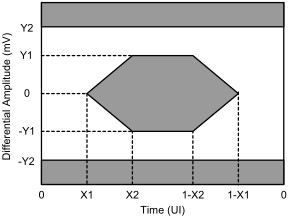
Figure 3. CAUI transmitter eye mask
|
3.3V LVCMOS Electrical Low Speed I/O InterfaceCharacteristic |
|
|||||
|
Parameter |
Symbol |
Condition |
Min. |
Typical |
Max. |
Unit |
|
Supply Voltage |
Vcc |
|
3.2 |
3.3 |
3.4 |
V |
|
Input High Voltage |
VIH |
|
2 |
|
Vcc+0.3 |
V |
|
Input Low Voltage |
VIL |
|
-0.3 |
|
0.8 |
V |
|
Input Leakage Current |
IIN |
|
-10 |
|
+10 |
mA |
|
Output High Voltage (IOH =-100uA) |
VOH |
|
Vcc-0.2 |
|
Vcc+0.3 |
V |
|
Output Low Voltage (IOL =100uA) |
VOL |
|
-0.3 |
|
0.2 |
V |
|
Minimum Pulse Width of Control Pin Signal |
t_CNTL |
|
100 |
|
|
us |
Notes.
(MOD_RSTn, MOD_LOPWR, TX_DIS, PRG_CNTL, MOD_ABS, RX_LOS, GLB_ALRMn, PRG_ALRM ) are
LVCMOS I/O interfaces.
|
1.2V LVCMOS Electrical Low Speed I/O InterfaceCharacteristic |
|
|||||
|
Parameter |
Symbol |
Condition |
Min. |
Typical |
Max. |
Unit |
|
Input High Voltage |
VIH |
|
0.84 |
|
1.5 |
V |
|
Input Low Voltage |
VIL |
|
-0.3 |
|
0.36 |
V |
|
Input Leakage Current |
IIN |
|
-100 |
|
+100 |
uA |
|
Output High Voltage |
VOH |
|
1.0 |
|
1.5 |
V |
|
Output Low Voltage |
VOL |
|
-0.3 |
|
0.2 |
V |
|
Output High Current |
IOH |
|
|
|
-4 |
mA |
|
Output Low Current |
IOL |
|
+4 |
|
|
mA |
|
Input capacitance |
Ci |
|
|
|
10 |
pF |
Notes.
(MDIO, MDC, PRTADR4:0) are 1.2V LVCMOS I/O interfaces
|
Timing Parameters for CFP Hardware Signal Pins |
|
|
||||
|
Parameter |
Symbol |
Condition |
Min. |
Typical |
Max. |
Unit |
|
Hardware MOD_LOPWR assert |
t_MOD_LOPWR_assert |
|
|
|
1 |
ms |
|
Hardware MOD_LOPWR deassert |
t_MOD_LOPWR_deass ert |
|
|
|
10 |
s |
|
Receiver Loss of Signal Assert Time |
t_loss_assert |
|
|
|
100 |
us |
|
Receiver Loss of Signal De-Assert Time |
t_loss_deassert |
|
|
|
100 |
us |
|
Global Alarm Assert Delay Time |
GLB_ALRMn_assert |
|
|
|
150 |
ms |
|
Global Alarm De-Assert Delay Time |
GLB_ALRMn_deassert |
|
|
|
150 |
ms |
|
Management Interface Clock Period |
t_prd |
|
250 |
|
|
ns |
|
Host MDIO t_setup |
t_setup |
|
10 |
|
|
ns |
|
Host MDIO t_hold |
t_hold |
|
10 |
|
|
ns |
|
CFP MDIO t_delay |
t_delay |
|
0 |
|
175 |
ns |
|
Initialization time from Reset |
t_initialize |
|
|
|
2.5 |
s |
|
Transmitter Disabled (TX_DIS asserted) |
t_deassert |
|
|
|
100 |
us |
|
Transmitter Enabled (TX_DIS de-asserted) |
t_assert |
|
|
|
2 |
ms |
|
MDIO and MDC Timing Characteristics |
|
|
|||||||||||
|
Parameter |
Symbol |
Condition |
Min. |
Typical |
Max. |
Unit |
|||||||
|
Management Interface Clock Frequency |
F_MDC |
|
0.1 |
|
4 |
MHz |
|||||||
|
Management Interface Clock Period |
t_prd |
|
250 |
|
10000 |
ns |
|||||||
|
Host MDIO t_setup |
t_setup |
|
10 |
|
|
ns |
|||||||
|
Host MDIO t_hold |
t_hold |
|
10 |
|
|
ns |
|||||||
|
CFP MDIO t_delay1 |
t_delay |
|
0 |
|
175 |
ns |
|||||||
|
MDC high and low time |
twidth |
|
40 |
|
60 |
% |
|||||||
|
|
160 |
|
|
ns |
|||||||||
|
MDIO/MDC termination in CFP |
Zt |
|
100 |
|
|
kOh |
|||||||
|
|
|
|
|
|
|
m |
|||||||
Notes.
[1] Delay from MDC rising edge to MDIO data change.
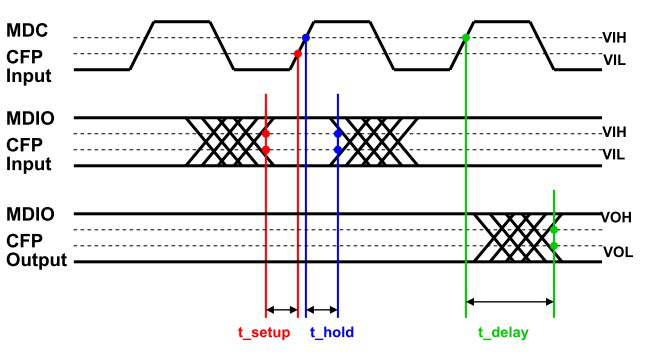
Figure 4. MDIO & MDC Timing Diagram
|
|
Reference Clock Characteristics |
|
||||
|
Parameter |
Symbol |
Condition |
Min. |
Typical |
Max. |
Unit |
|
Impedance |
Zd |
|
80 |
100 |
120 |
ohm |
|
Frequency |
|
|
1/64 of host lane rate |
|
||
|
Frequency Stability |
Xf |
|
-100 |
|
+100 |
ppm1 |
|
|
-20 |
|
+20 |
ppm2 |
||
|
Input Differential Voltage |
Vdiff |
|
400 |
|
1200 |
mV3 |
|
RMS Jitter |
σ |
|
|
|
10 |
ps4 |
|
Clock Duty Cycle |
|
|
40 |
|
60 |
% |
|
Clock Rise/Fall Time 10/90% |
Tr/f |
|
200 |
|
1250 |
ps5 |
Notes.
[1] For Ethernet applications
[2] For Telecom applications
[3] Peak to Peak Differential
[4] Random Jitter. Over frequency band of 10kHz < f < 10MHz
[5] 1/64 of electrical lane
|
Transmitter & Receiver Monitor Clock Characteristi |
cs |
|
||||
|
Parameter |
Symbol |
Condition |
Min. |
Typical |
Max. |
Unit |
|
Impedance |
Zd |
|
80 |
100 |
120 |
ohm |
|
Frequency |
|
|
1/8 of network lane rate |
|
||
|
Ouput Differential Voltage |
Vdiff |
|
400 |
|
1200 |
mV1 |
|
Clock Duty Cycle |
|
|
40 |
|
60 |
% |
Notes.
[1] Peak to Peak Differential

Figure 5. CFP Module Pad Layout
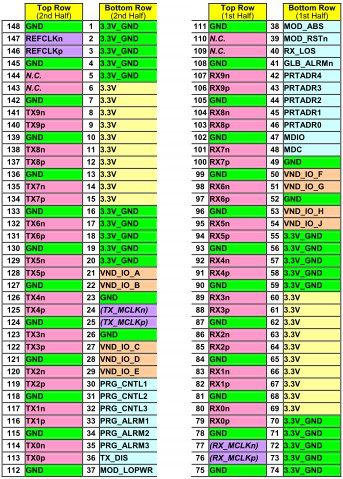
Figure 6. CFP Module Pin Map
Notes.
[1] Pin 21,22,27,28,29,50,51,53,54 are internally used and NOT allowed to connect any signal and power.
[2] Pin 24,25,76,77 are disabled unless MCLK output is enabled via MDIO.
|
PIN |
Name |
I/O |
Logic |
Description |
|
1 |
3.3V_GND |
|
|
3.3V Module Supply Voltage Return Ground, can be separate or tied together with Signal Ground |
|
2 |
3.3V_GND |
|
|
|
|
3 |
3.3V_GND |
|
|
|
|
4 |
3.3V_GND |
|
|
|
|
5 |
3.3V_GND |
|
|
|
|
6 |
3.3V |
|
|
3.3V Module Supply Voltage |
|
7 |
3.3V |
|
|
|
|
8 |
3.3V |
|
|
|
|
9 |
3.3V |
|
|
|
|
10 |
3.3V |
|
|
|
|
11 |
3.3V |
|
|
|
|
12 |
3.3V |
|
|
|
|
13 |
3.3V |
|
|
|
|
14 |
3.3V |
|
|
|
|
15 |
3.3V |
|
|
|
|
16 |
3.3V_GND |
|
|
3.3V Module Supply Voltage Return Ground, can be separate or tied together with Signal Ground |
|
17 |
3.3V_GND |
|
|
|
|
18 |
3.3V_GND |
|
|
|
|
19 |
3.3V_GND |
|
|
|
|
20 |
3.3V_GND |
|
|
|
|
21 |
VND_IO_A |
I/O |
|
Module Vendor I/O. Must No Connect at host board |
|
22 |
VND_IO_B |
I/O |
|
Module Vendor I/O. Must No Connect at host board |
|
23 |
GND |
|
|
|
|
24 |
TX_MCLKn |
O |
CML |
TX Monitor Clock Output (Negative) |
|
25 |
TX_MCLKp |
O |
CML |
TX Monitor Clock Output (Positive) |
|
26 |
GND |
|
|
|
|
27 |
VND_IO_C |
I/O |
|
Module Vendor I/O. Must No Connect at host board |
|
28 |
VND_IO_D |
I/O |
|
Module Vendor I/O. Must No Connect at host board |
|
29 |
VND_IO_E |
I/O |
|
Module Vendor I/O. Must No Connect at host board |
|
30 |
PRG_CNTL1 |
I |
LVCMOS w/ PUR |
Programmable Control 1 set over MDIO, MSA Default: TRXIC_RSTn, TX & RX ICs reset, "0": reset, "1" or NC: enabled = not used 4.75kohm pull up in the module |
|
31 |
PRG_CNTL2 |
I |
LVCMOS w/ PUR |
Programmable Control 2 set over MDIO, MSA Default: |
|
|
|
|
|
Hardware Interlock LSB, "00": ≤8W, "01":≤16W, "10": ≤24W, "11" or NC: ≤32W = not used 4.75kohm pull up in the module |
|
32 |
PRG_CNTL3 |
I |
LVCMOS w/ PUR |
Programmable Control 3 set over MDIO, MSA Default: Hardware Interlock MSB, "00": ≤8W, "01": ≤16W, "10": ≤24W, "11" or NC: ≤32W = not used 4.75kohm pull up in the module |
|
33 |
PRG_ALRM1 |
O |
LVCMOS |
Programmable Alarm 1 set over MDIO, MSA Default: HIPWR_ON, "1": module power up completed, "0": module not high powered up |
|
34 |
PRG_ALRM2 |
O |
LVCMOS |
Programmable Alarm 2 set over MDIO, MSA Default: MOD_READY, "1": Ready, "0": not Ready. |
|
35 |
PRG_ALRM3 |
O |
LVCMOS |
Programmable Alarm 3 set over MDIO, MSA Default: MOD_FAULT, fault detected, "1": Fault, "0": No Fault |
|
36 |
TX_DIS |
I |
LVCMOS w/ PUR |
Transmitter Disable for all lanes, "1" or NC = transmitter disabled, "0" = transmitter enabled |
|
37 |
MOD_LOPWR |
I |
LVCMOS w/ PUR |
Module Low Power Mode. "1" or NC: module in low power (safe) mode, "0": power-on enabled 4.75kohm pull up in the module |
|
38 |
MOD_ABS |
O |
GND |
Module Absent. "1" or NC: module absent, "0": module present, Pull Up Resistor on Host |
|
39 |
MOD_RSTn |
I |
LVCMOS w/ PDR |
Module Reset. "0" resets the module, "1" or NC = module enabled, 4.75kohm Pull Down Resistor in Module |
|
40 |
RX_LOS |
O |
LVCMOS |
Receiver Loss of Optical Signal, "1": low optical signal, "0": normal condition |
|
41 |
GLB_ALRMn |
O |
LVCMOS |
Global Alarm. “0": alarm condition in any MDIO Alarm register, "1": no alarm condition, Open Drain, Pull Up Resistor on Host |
|
42 |
PRTADR4 |
I |
1.2V CMOS |
MDIO Physical Port address bit 4 |
|
43 |
PRTADR3 |
I |
1.2V CMOS |
MDIO Physical Port address bit 3 |
|
44 |
PRTADR2 |
I |
1.2V CMOS |
MDIO Physical Port address bit 2 |
|
45 |
PRTADR1 |
I |
1.2V CMOS |
MDIO Physical Port address bit 1 |
|
46 |
PRTADR0 |
I |
1.2V CMOS |
MDIO Physical Port address bit 0 |
|
47 |
MDIO |
I/O |
1.2V CMOS |
Management Data I/O bi-directional data (electrical specs as per 802.3ae and ba) |
|
48 |
MDC |
I |
1.2V CMOS |
Management Data Clock (electrical specs as per 802.3ae and ba) |
|
49 |
GND |
|
|
|
|
50 |
VND_IO_F |
I/O |
|
Module Vendor I/O. Must No Connect at host board |
|
51 |
VND_IO_G |
I/O |
|
Module Vendor I/O. Must No Connect at host board |
|
52 |
GND |
|
|
|
|
53 |
VND_IO_H |
I/O |
|
Module Vendor I/O. Must No Connect at host board |
|
54 |
VND_IO_J |
I/O |
|
Module Vendor I/O. Must No Connect at host board |
|
55 |
3.3V_GND |
|
|
3.3V Module Supply Voltage Return Ground, can be separate or tied together with Signal Ground |
|
56 |
3.3V_GND |
|
|
|
|
57 |
3.3V_GND |
|
|
|
|
58 |
3.3V_GND |
|
|
|
|
59 |
3.3V_GND |
|
|
|
|
60 |
3.3V |
|
|
3.3V Module Supply Voltage |
|
61 |
3.3V |
|
|
|
|
62 |
3.3V |
|
|
|
|
63 |
3.3V |
|
|
|
|
64 |
3.3V |
|
|
|
|
65 |
3.3V |
|
|
|
|
66 |
3.3V |
|
|
|
|
67 |
3.3V |
|
|
|
|
68 |
3.3V |
|
|
|
|
69 |
3.3V |
|
|
|
|
70 |
3.3V_GND |
|
|
3.3V Module Supply Voltage Return Ground, can be separate or tied together with Signal Ground |
|
70 |
3.3V_GND |
|
|
|
|
71 |
3.3V_GND |
|
|
|
|
72 |
3.3V_GND |
|
|
|
|
73 |
3.3V_GND |
|
|
|
|
74 |
3.3V_GND |
|
|
|
PIN |
Name |
I/O |
Logic |
Description |
|
75 |
GND |
|
|
|
|
76 |
RX_MCLKp |
O |
|
RX Monitor Clock Output (Positive) |
|
77 |
RX_MCLKn |
O |
|
RX Monitor Clock Output (Negative) |
|
78 |
GND |
|
|
|
|
79 |
RX0p |
O |
HS I/O |
Lane 0 Receiver Output (Positive) |
|
80 |
RX0n |
O |
HS I/O |
Lane 0 Receiver Output (Negative) |
|
81 |
GND |
|
|
|
|
82 |
RX1p |
O |
HS I/O |
Lane 1 Receiver Output (Positive) |
|
83 |
RX1n |
O |
HS I/O |
Lane 1 Receiver Output (Negative) |
|
84 |
GND |
|
|
|
|
85 |
RX2p |
O |
HS I/O |
Lane 2 Receiver Output (Positive) |
|
86 |
RX2n |
O |
HS I/O |
Lane 2 Receiver Output (Negative) |
|
87 |
GND |
|
|
|
|
88 |
RX3p |
O |
HS I/O |
Lane 3 Receiver Output (Positive) |
|
90 |
GND |
|
|
|
|
91 |
RX4p |
O |
HS I/O |
Lane 4 Receiver Output (Positive) |
|
92 |
RX4n |
O |
HS I/O |
Lane 4 Receiver Output (Negative) |
|
93 |
GND |
|
|
|
|
94 |
RX5p |
O |
HS I/O |
Lane 5 Receiver Output (Positive) |
|
95 |
RX5n |
O |
HS I/O |
Lane 5 Receiver Output (Negative) |
|
96 |
GND |
|
|
|
|
97 |
RX6p |
O |
HS I/O |
Lane 6 Receiver Output (Positive) |
|
98 |
RX6n |
O |
HS I/O |
Lane 6 Receiver Output (Negative) |
|
99 |
GND |
|
|
|
|
100 |
RX7p |
O |
HS I/O |
Lane 7 Receiver Output (Positive) |
|
101 |
RX7n |
O |
HS I/O |
Lane 7 Receiver Output (Negative) |
|
102 |
GND |
|
|
|
|
103 |
RX8p |
O |
HS I/O |
Lane 8 Receiver Output (Positive) |
|
104 |
RX8n |
O |
HS I/O |
Lane 8 Receiver Output (Negative) |
|
105 |
GND |
|
|
|
|
106 |
RX9p |
O |
HS I/O |
Lane 9 Receiver Output (Positive) |
|
107 |
RX9n |
O |
HS I/O |
Lane 9 Receiver Output (Negative) |
|
108 |
GND |
|
|
|
|
109 |
NC |
|
|
Not Connected Internally |
|
110 |
NC |
|
|
Not Connected Internally |
|
111 |
GND |
|
|
|
|
112 |
GND |
|
|
|
|
113 |
TX0p |
I |
HS I/O |
Lane 0 Transmitter Input (Positive) |
|
114 |
TX0n |
I |
HS I/O |
Lane 0 Transmitter Input (Negative) |
|
115 |
GND |
|
|
|
|
116 |
TX1p |
I |
HS I/O |
Lane 1 Transmitter Input (Positive) |
|
117 |
TX1n |
I |
HS I/O |
Lane 1 Transmitter Input (Negative) |
|
118 |
GND |
|
|
|
|
119 |
TX2p |
I |
HS I/O |
Lane 2 Transmitter Input (Positive) |
|
120 |
TX2n |
I |
HS I/O |
Lane 2 Transmitter Input (Negative) |
|
121 |
GND |
|
|
|
|
122 |
TX3p |
I |
HS I/O |
Lane 3 Transmitter Input (Positive) |
|
123 |
TX3n |
I |
HS I/O |
Lane 3 Transmitter Input (Negative) |
|
124 |
GND |
|
|
|
|
125 |
TX4p |
I |
HS I/O |
Lane 4 Transmitter Input (Positive) |
|
126 |
TX4n |
I |
HS I/O |
Lane 4 Transmitter Input (Negative) |
|
127 |
GND |
|
|
|
|
128 |
TX5p |
I |
HS I/O |
Lane 5 Transmitter Input (Positive) |
|
129 |
TX5n |
I |
HS I/O |
Lane 5 Transmitter Input (Negative) |
|
130 |
GND |
|
|
|
|
131 |
TX6p |
I |
HS I/O |
Lane 6 Transmitter Input (Positive) |
|
132 |
TX6n |
I |
HS I/O |
Lane 6 Transmitter Input (Negative) |
|
133 |
GND |
|
|
|
|
134 |
TX7p |
I |
HS I/O |
Lane 7 Transmitter Input (Positive) |
|
135 |
TX7n |
I |
HS I/O |
Lane 7 Transmitter Input (Negative) |
|
136 |
GND |
|
|
|
|
137 |
TX8p |
I |
HS I/O |
Lane 8 Transmitter Input (Positive) |
|
138 |
TX8n |
I |
HS I/O |
Lane 8 Transmitter Input (Negative) |
|
139 |
GND |
|
|
|
|
140 |
TX9p |
I |
HS I/O |
Lane 9 Transmitter Input (Positive) |
|
141 |
TX9n |
I |
HS I/O |
Lane 9 Transmitter Input (Negative) |
|
142 |
GND |
|
|
|
|
143 |
NC |
|
|
Not Connected Internally |
|
144 |
NC |
|
|
Not Connected Internally |
|
145 |
GND |
|
|
|
|
146 |
REFCLKp |
I |
|
Reference Clock Input (Positive) |
|
147 |
REFCLKn |
I |
|
Reference Clock Input (Negative) |
|
148 |
GND |
|
|
|
100Gb/s CFP mechanical dimensions should be compliant with CFP MSA specification. Detailed dimensions are shown in Figure 7.
Uint:mm

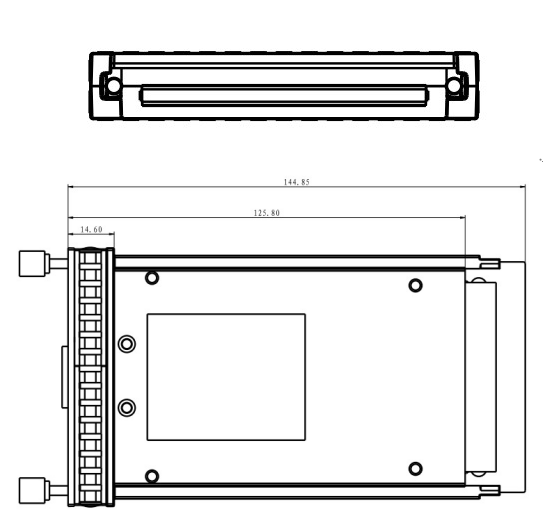
The mechanical dimensions of the electrical connectors on the CFP Host PCB are shown in Figure 8.
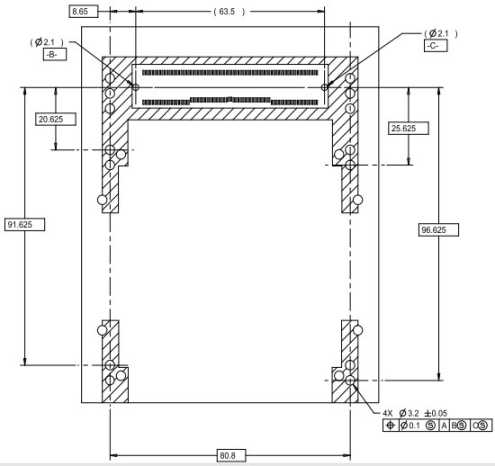

Figure 8
|
|
CFP Mechanical Char |
acteristics |
|
|
|
Max. |
Unit |
Notes |
|
Weight |
350 |
g |
|
|
Flatness |
0.15 |
mm |
|
|
Roughness |
6.3 |
Ra |
|
CFP transceivers supports the MDIO interface specified in IEEE802.3 Clause 45. This 2-wire management data I/O interface is provided for the module status monitoring and control. The management data clock (MDC) provides clocking for the data that is passed on the MDIO port. Five further pins allow for loading of a port address (PORT_ADDR0-4) into the module.
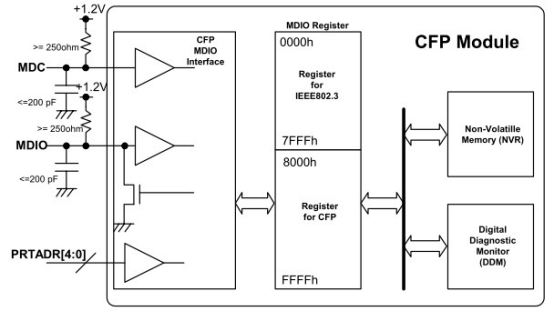
For more detailed information please refer to " CFP MSA Management Interface Specification Version 2.2 r06".
|
Part No. |
|
|
Specification |
|
|
|
|
Pack |
Rate |
Tx |
Rx |
Reach |
Connetor |
|
|
MTRC-DG3CA |
CFP |
103.1G 111.8G |
4*28G LAN-WDM EML TOSA |
4*28G PIN ROSA |
10km |
LC |
Wuhan Huagong Genuine Optics Technology Co., Ltd
Address: Science & Technology Region of HUST, Donghu High-Tech Zone
Wuhan, Hubei Province, 430223, China
l Tel: +86-27-87180102
l Fax: +86-27-87180220
Statement